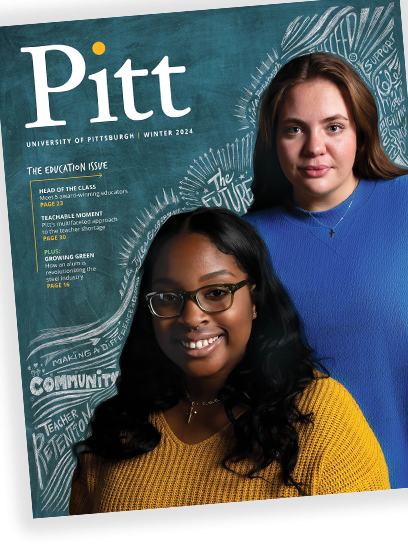
Gretchen Rosado tucks herself into the back of a room at UPMC Magee-Womens Hospital, trying to look inconspicuous. She’s there to hear Pitt researcher Miguel Brieño-Enríquez talk about reproduction and aging in naked mole rats. She’s clearly the only first-year undergraduate student who’s shown up.
Though most of what Brieño-Enríquez says is beyond Rosado’s understanding, she stays until the very end of his presentation. And then she patiently picks her way through the crowd to front of the room until she’s standing in front of the assistant professor. She thrusts out her hand.
“Hi, I’m Gretchen,” she tells him. “I sent you an email, and I wanted to talk to you about working in your lab.”
Brieño-Enríquez smiles at this student, who’s trembling with nerves and excitement. He doesn’t have time to talk, but any first-year who braves a discussion about naked mole rats deserves a shot.
“Why don’t you come in next week for an interview,” he suggests.
Rosado grew up in Puerto Rico, an effervescent, inquisitive child who regaled her family and friends with a constant chorus of “¿Pero por qué? ¿Pero por qué?” — But why? She wanted to know everything about everything in her world, even when the answer led to more questions; especially when the answer led to more questions.
As she got older, she developed a love of science, which let her ask all the questions she desired and then test the answers. But, as she began to look at colleges, she learned that in Puerto Rico, students are required to complete two years of study before they can work in a campus lab.
That just wouldn’t do.
“I had already been to science camps that prepare you for med school and research, and knew I loved hands-on science,” Rosado says. “I felt like, if I was just learning about it in the classroom, it was going to be so tedious that I wouldn't stick with it. I knew I needed to get hands-on research.”
So, she turned her own college search north, to the mainland United States’ top institutions, where undergraduates are encouraged to seek out research opportunities, and found the University of Pittsburgh and Miguel Brieño-Enríquez.
Rosado saw in Brieño-Enríquez a person to model her own career after. He grew up in Mexico and earned doctorate and medical degrees and conducts research in the United States. Plus, he spoke her language.
In fact, in the promised interview, after Brieño-Enríquez asked and Rosado answered a few questions in English, he paused and suggested they switch to Spanish. He and his graduate student researchers, all native Spanish speakers, preferred it in the lab.
“Then he asked me to join the lab, and we have never, ever gone back (to English),” Rosado says. “It was the best thing to ever happen.”
The best thing because in Brieño-Enríquez’s lab, Rosado not only gets to do real research — she’s already co-authored one paper and is working on a second — but she can do it in a place where she feels safe and understood. Though she’s been speaking English since middle school and always uses English for scientific terms, she still writes best in Spanish, thinks best in Spanish, expresses ideas best in Spanish. In the lab, where minutiae and precision are crucial, speaking her native language matters.
“It's a relief, being able to speak my language and be like, ‘OK, you understand me, and I understand you,’ and I can actually be myself and ask way more questions than I would have asked only in English,” Rosado says. “I go outside and talk to people in English, but I feel like I can just be myself in the lab, I guess.”
Working in Brieño-Enríquez’s lab has opened more opportunities to Rosado. She interned at a lab in San Diego the summer before her sophomore year. Last summer, she returned to Puerto Rico for a program that allowed her to shadow 10 medical specialists working in underrepresented communities. While she was there, a power outage cut electricity in the hospital — no lights, no machines. Since Hurricane Maria ripped across the island in 2017, it’s not uncommon, but it was eye opening. She realized then that she wouldn’t be following Brieño-Enríquez’s precise career path after all.
When she graduates from Pitt, instead of staying in the U.S., Rosado is going home, where all she’s learned in the lab will make her a top candidate for medical school and help her to help her island.
“Some people, when they have the opportunities I've had, it's easy to want to be comfortable,” Rosado says. “I know I could find a place at Pitt to stay forever, because I love it here. But I just can't look away from my home.”



